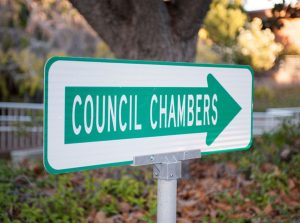Now the subject of a lawsuit against Santa Clara, Republic Metropolitan’s (ReMet) five-year-old development proposal and now-defunct exclusive negotiating agreement (ENA) for 500 Benton St. has a problematic history.
ReMet introduced its proposal to the City in 2017 as a 545-bed student housing project on public land that is currently the CalTrain station parking lot, part-owned by Santa Clara and part-owned by the VTA. The developer described it as “a purpose-built student housing project,” “a substantial solution to the student housing deficit at Santa Clara University,” “600-800 beds of student housing” and “not your parents’ dorm.”[Proposed Student Housing – Republic].
Controversial From the Start, Alternative Proposal Ignored
The proposal set off a volcano of opposition.
Opponents raised questions about using public land earmarked for transit-oriented housing to build housing for people that only had to walk across the street to school. They further questioned how the project would affect Santa Clara’s goals for revitalizing downtown—the students are already there—and the propriety of using public land to ameliorate a private university’s housing problem.
Even affordable housing advocate SV@Home opposed the project, writing that “prioritizing student housing does not take full advantage” of the potential for affordable and transit-oriented housing on the site.
ReMet re-branded the project as affordable co-housing* for professionals—judges, lawyers and firefighters were named—who preferred not to commute on weekdays, as well as students. But the “student housing” label stubbornly stuck.
The metric that allowed ReMet to pitch the development as affordable was the rental cost ($1,500-$1,700) per bed/bath “unit.” However, each two- and four-bed/bath apartment would bring in $3,000 to $7,000 a month—comparable with San Francisco market rents. Conventional apartments were planned for the VTA land.
While ReMet was pitching its project in the Spring of 2017, SummerHill Homes offered the City a different vision for the parcel. SummerHill proposed 215 market and below-market-rate housing units, with retail, and parking for residents and transit. As far as The Weekly can determine, the Council never discussed SummerHill’s proposal.
ReMet got its ENA in December 2017. The City Council subsequently extended it twice.
Surplus Land Act Throws Obstacle in Project’s Path
The Surplus Land Act (SLA) iceberg that would eventually shipwreck the project started materializing in 2019. That law requires cities to offer land that had been declared surplus to affordable housing developers. Only if there are no offers, can cities accept other bids. The law exempts agreements entered into prior to the law as long as the sale or lease takes place by Dec. 31, 2022. However, to complicate the landscape, there are other state laws governing the disposal of surplus land and the SLA doesn’t address which laws take precedence.
Following a court decision reinforcing the applicability of the 2019 SLA then-City Attorney Brian Doyle—who lives in the Old Quad, near the development—advised the Council that the SLA would apply to the sale or lease of any city-owned surplus land, and that “any current negotiating agreement under an ENA…that was not the result of a procedure that followed the [SLA] should be discontinued.” [Surplus Land Act Public Memo 12.18.19]
In mid-2020 ReMet asked the City for a third extension to the ENA and the Council took it up in July. The confusing discussion that ensued gave no clue that council members had read—or were even aware of—the City Attorney’s December 2019 memo.
Doyle said that approving the ENA extension depended on ReMet agreeing to reimburse the City for penalties the project might incur under the SLA, and stated the developer was favorable to it.
ReMet’s agreement, however, is unclear. In 2021 ReMet VP of Development, Kelly Macy told The Weekly that the developer never agreed to this, saying such a commitment “without a ceiling” was unreasonable. And then in an apparent about-face, in July 2021, she wrote to the City that the company had agreed to indemnify Santa Clara for possible SLA violations.
Nonetheless, Doyle insisted that “determination of whether the land is surplus would have to be made before the land could be disposed of.” His remarks led to what appears to be the Council’s first discussion of the SLA with respect to this property. Mayor Lisa Gillmor stated that this wasn’t surplus land because it was the site of an important City groundwater well and the train station parking lot and these are active public uses (i.e., not surplus).
That was the end of the SLA discussion. The Council moved on to an in-depth discussion of well relocation mechanics—the well on the property would have to be moved—and unanimously approved the ENA extension, pending VTA approval.
In October 2020, in the course of correspondence about well and water issues with ReMet attorney Stephen Ellick, Doyle sent Ellick a link to a story about an SLA lawsuit against a Santa Monica development project, with the comment, “The risk of a challenge under the Surplus Land Act is very real to us.”
The same month, while he was campaigning for a seat on the Santa Clara City Council,* ReMet lobbyist/lawyer Rob Mezzetti wrote Assistant City Manager Ruth Shikada detailing reasons the project was exempt from the SLA, not least of which was that the ENA was signed prior to the 2019 law. Further, the parcel was subject to other laws that, in his opinion, superseded the SLA. [ReMet cox castl nicholson re SLA 9-17-20]
Meanwhile, VTA pushed the ENA approval into the fall, with negotiations appearing on closed session agendas through September and into October.
In November, in a letter that ReMet says was a complete surprise, Assistant City Manager Ruth Shikada told ReMet that the City considered the ENA expired and was “rescinding its authorization on Republic’s Planning application for environmental review and entitlements.” After this letter, VTA considered the project dead.
In its lawsuit, ReMet accuses Santa Clara of holding an improper October closed session meeting where the project was killed. Further, ReMet accuses Doyle of being the catalyst for the City’s about-face.
Trying for an Overtime Win
ReMet, however, wasn’t accepting Shikada’s letter as the end of the story. To resuscitate the expired agreement, ReMet pulled out all the stops in a lobbying campaign that enlisted local luminaries like transportation guru and Mineta Institute Executive Director Emeritus, Rod Diridon, Sr.
In January 2021, ReMet introduced its newest VP Christ Shay, the former SCU Assistant VP for University Operations who worked with ReMet on the project. Shay joined the lobbying team of Ed McGovern — a 49ers lobbyist — Mezzetti and former council member and developer lobbyist Kevin Moore, who is a lifelong friend of Gillmor’s.
Shay and McGovern energetically lobbied new Council Members Anthony Becker, Suds Jain and Kevin Park, besieging them with meeting requests. In April, Mezzetti asked the Council to put the project on the agenda with an eye to reopening negotiations.
State Senator Bob Wieckowski was persuaded to sponsor a bill to “clarify” the application of the SLA to 500 Benton St. In the end, Wieckowski’s bill never went anywhere but did reignite the project’s opponents. In July, the Council voted not to reopen discussions about the expired agreement.
Shortly before the 2020 election that upset Gillmor’s Council control, ReMet donated $5,000 to the developer-funded police union PAC that conducted a vicious smear campaign against the opponents of Gillmor’s candidate slate. One of Gillmor’s candidates in that election was ReMet’s attorney-lobbyist Mezzetti.
ReMet has said in its lawsuit that it has already “incurred significant detriment an economic cost…to amounts exceeding at least $5 million.” This begs the question, why would a company want to spend more on a project that is going on five years old without a shovel in the ground, especially with costs escalating by the month?
One reason may be that any new proposal is likely to be subject to the SLA, and $1,500-$1,700 rent-by-the-bed units may not pass muster as officially affordable. And that rent-by-the-bed plan is likely worth $9 to $10 million a year in revenue. Another is that the rent-by-the-bed plan is unlikely to be reconsidered by the Council that refused to reconsider it in 2021, even if a court forces the City back into negotiations. Additionally, that rent-by-the-bed plan is likely worth $9 to $10 million a year in revenue.
ReMet did not respond to our requests for comment.
*Co-housing is an ‘intentional community’ that involves private units clustered around shared common space, and frequently common dining rooms. There are several in the Bay Area, including Mountain View’s senior co-housing community.












0 comments